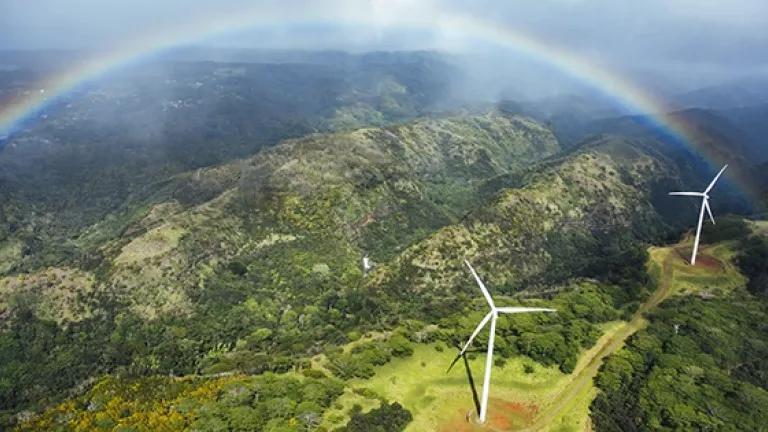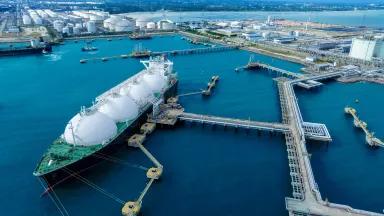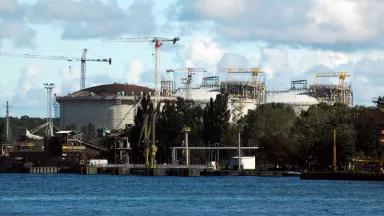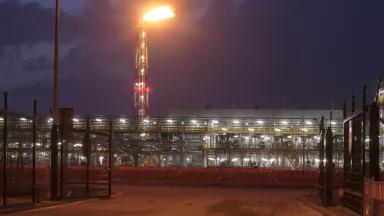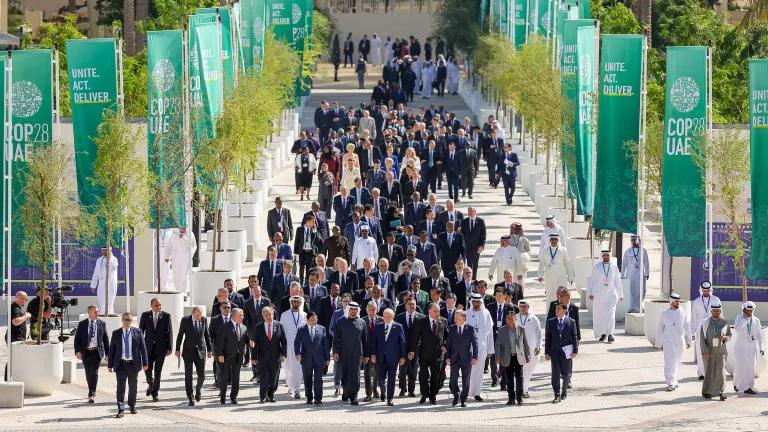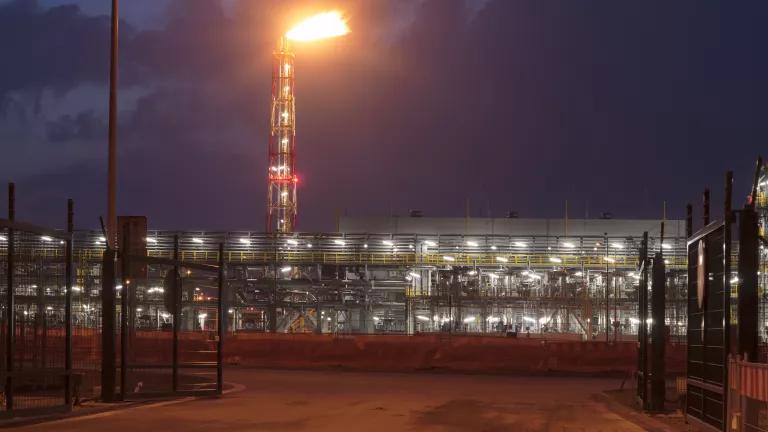International Community Wants Biden to Act on LNG
Allies from key countries around the world came out resoundingly in support of the Biden administration's decision to pause permitting of new liquefied natural gas export facilities.
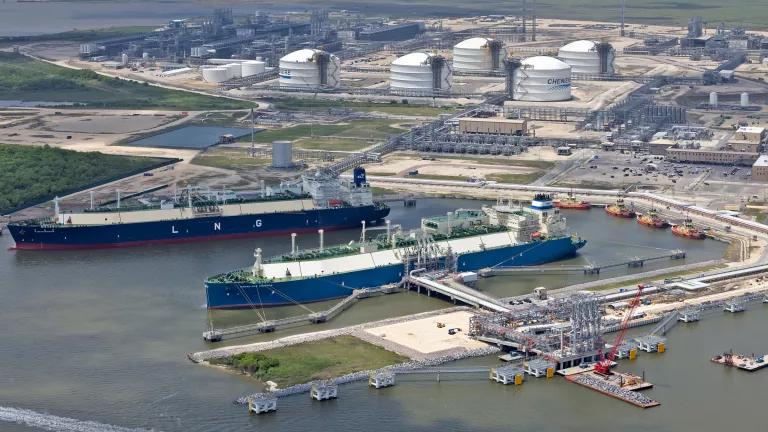
Tanker ships docked at Cheniere Energy’s Sabine Pass LNG facility in Cameron Parish, Louisiana
Julie Dermansky for NRDC
The Biden administration announced that it will pause the permitting of new liquefied natural gas (LNG) export facilities and establish a process to review whether such projects are in the public interest of Americans. This decision “is the right call,” says Manish Bapna, president of NRDC. “The administration needs to pause to get the facts.” Allies from key countries around the world—from Europe to Asia (and in between)—came out resoundingly in support of that decision.*
More than 65 lawmakers and more than 100 organizations from Europe and the Asia Pacific welcomed the decision in their respective letters to President Biden. This was joined by individual leaders from those regions expressing their support for the announcement.
European support
Sixty-seven members of the European Parliament and European national parliaments called for a pause on LNG export approvals, noting that Europe’s present gas needs are being met at current import levels, and that construction of new LNG infrastructure would not be in line with climate commitments made by both the United States and the European Union at COP28. Their letter also expressed deep concern over the environmental justice impacts of U.S. LNG exports, urging the president not to use Europe “as an excuse to expand LNG exports that threaten our shared climate and have dire impacts on U.S. communities,” further impacting Indigenous and low-income communities of color, both at home and abroad.
Forty-eight civil society organizations from across Europe emphasized that the continent is ready for the next winter in their own letter to President Biden and U.S. Secretary of Energy Jennifer Granholm. Their message reiterated that “Europe’s existing gas supply network is sufficient, taking into account both its own import infrastructure and U.S. LNG export infrastructure.”
European civil society leaders and energy expertsemphasized their support:
- Jennifer Morgan, state secretary and special envoy for international climate action, Federal Foreign Office of Germany: “At COP28, all countries agreed to transition away from fossil fuels. This decision is reshaping the calculus on future energy needs, and with it, government decision-making, including in the U.S. Welcome news that the U.S. has decided to pause and re-evaluate the analysis underlying approvals of additional LNG terminals, in light of climate impacts and environmental justice but also a reassessment of their economic viability and relevance to future energy security.”
- The German ministry for the economy and climate "said the country’s current security of supply would not be interrupted by Biden’s announcement."
- Laurence Tubiana, CEO, European Climate Foundation, and one of the key architects of the Paris Agreement: “The U.S. decision to pause permitting for new LNG export facilities is an act of global leadership, putting the historic agreement at COP28 to transition away from fossil fuels into practice….In the heat of the energy crisis, U.S.-supplied LNG helped Europe to reduce its reliance on Russian gas. But this is not a long-term solution. LNG is just as vulnerable to geopolitical volatility and prone to sudden price fluctuations. Europe’s gas demand has already fallen by 19 percent below 2019–21 levels, and this steep decline will continue, thanks to the E.U.’s Green Deal policies. Swapping one source of fossil fuels for another is not a viable strategy for energy or climate security. This can only be achieved by accelerating the transition to renewables and clean heating—exactly what the E.U. is aiming to do under the Green Deal and REPowerEU.”
- EU energy official: "this pause will not have any short-to-medium term impacts on the EU’s security of supply".
- Linda Kalcher, executive director, Strategic Perspectives: “European governments and companies are massively scaling up renewables-based solutions as it's the best economic and energy security choice. New LNG investments will be a white elephant [that] U.S. investors will live to regret.”
- Dr. Stefan Rahmstorf, climatologist, Potsdam Institute for Climate Impact Research and University of Potsdam, Germany: “We are already very close to the 1.5 degree Celsius climate change limit, so we can only emit more CO2 if, at the same time, the fossil methane emissions are reduced drastically. Expanding LNG production would do just the opposite.”
- Luca Bergamaschi, cofounding director, ECCO think tank, Italy: “Biden’s decision is good business for U.S. citizens and businesses as new export terminals might drive up U.S. domestic prices and waste investment for a European gas market in rapid decline.”
- Petter Lydén, head of international climate policy, Germanwatch, Germany: “Germany and the E.U. need to take a sober look at the changing global energy landscape, where the decision at the COP28 climate conference to transition away from fossil fuels is already having an impact. The E.U. must now come up with a plan to rapidly reduce its dependence on fossil gas.”
Asia Pacific support
In their letter to President Biden and Secretary Granholm, 52 civil society organizations from the Asia Pacific (APAC) region were clear: “A halt in new LNG export permits will not endanger the energy security of APAC nations.” Like Europe, the APAC region does not need new LNG supply. South Korea and Japan, the largest historical importers of U.S. LNG, are projected to significantly decrease domestic demand for gas over the coming decade. This decision from the Biden administration will help “ensure that all APAC countries irrevocably align their own needs with human rights and environmental impact at its core.”
Signatories to these letters urged the Biden administration to ensure that the pause will result in updated and robust guidelines that take into account climate impacts, environmental justice, and consumer utility bills.
Leading experts in the Asia Pacific region emphasized their support:
- Joojin Kim, CEO, Solutions for Our Climate, South Korea: “The latest decision from the United States reflects the need to center our energy system around people, not the fossil fuel industry. Each year, we see worsening climate disasters in Asia, driven by fossil fuels, costing the region countless lives and economic detriment. To put it quite simply, Asia does not want or need LNG. This region has rich resources for solar and wind energy, and investments in renewable energy in the area are ramping up. As the role of gas begins to dwindle, reassessing the need for new LNG exports is not only an important move to accelerate Asia’s energy transition but to avoid stranded asset risk for the United States.”
- Hyeyoung Jang, South Korea National Assembly Member, Strategy and Finance Committee: "South Korea, the biggest importer of US LNG in Asia, is set to reduce the use of LNG in the mid-to-long term and support the effort to triple global renewable energy capacity. In this critical moment, the decision from the US is an important signal for South Korea to accelerate its phase-out of fossil gas. We hope to see South Korea and the US leveraging their energy partnership to catalyze Asia's renewable energy transition, rather than prolonging the use of toxic fossil fuels."
- Tina Stege, Marshall Islands Climate Envoy: "The success of the #COP28 commitment to transition away from fossil fuels will depend on national-level decisions like this one."
- Lidy Nacpil, Joojin Kim and Yuki Tanabe: "Many climate and energy experts in Asia, including us, welcome this act of climate leadership from the United States. Now, let’s unpack why this decision will not hurt — but benefit — Asia, unlike many of the fossil fuel industry claims...Rather than relying on more LNG imports, Asia can invest in its energy security, which rests with a faster transition to renewable energy."
- Yuri Okubo, senior climate engagement strategist, Renewable Energy Institute, Japan: “Biden's decision is a positive stride for Japan and the wider Asia Pacific region, sending a clear signal to its financiers eyeing LNG expansion….What Japan and Asia urgently require for their energy and national security is a rapid expansion of domestically generated renewable energy. The decision sets the stage for a more sustainable path, underscoring the need for a mindful and responsible approach to our energy landscape.”
- Ayumi Fukakusa, deputy executive director, Friends of the Earth Japan: “This important decision by the Biden administration recognizes the tremendous harm [that] gas and LNG projects have inflicted on communities and ecosystems across the U.S. and along the Gulf Coast. This harm has been replicated up and down the LNG supply chain, including on communities in the Philippines, Indonesia, and Bangladesh. Stopping LNG development is the surest path to avoiding the very worst impacts of the climate crisis and achieving long-term energy security in Japan and across Asia.”
- Mark Ogge, principal advisor, the Australia Institute: “Australia’s LNG experience should be a warning to U.S. authorities considering approving enormous new LNG projects. Like the U.S., Australia had abundant cheap gas for decades until three large LNG terminals were approved in eastern Australia. This meant Australian customers were forced to compete on the global market for our own gas, and prices tripled within a few years. It also exposed Australians to global oil and gas price shocks like the Ukraine war, even though Australia doesn’t import any gas. Australia’s LNG experience has been devastating to manufacturers who rely on gas and driven up electricity prices, while delivering windfall profits to the gas companies.”
- Gerry Arances, founder and executive director, Center for Energy, Ecology, and Development (CEED), Philippines: “Asia does not need any new LNG. The region is already suffering from the impacts of unsustainable LNG build-out, and continued expansion will only cause further ecological and economic damage….Biden’s decision is a welcome first step for the U.S. to rethink the climate, economic, and environmental havoc it is causing to its own LNG-affected communities and the rest of the world. It is high time for the U.S. to deliver the climate leadership it owes, end its contributions to fossil fuel proliferation, and make way for a 100 percent renewable energy transition globally.”
- Lidy Nacpil, coordinator, Asian Peoples’ Movement on Debt and Development, Philippines: “This decision will help advance rapid and just transition to renewable energy–based systems in the Asia region and other places where the U.S. exports LNG.”
- Bhima Yudhistira, economist, CELIOS (Center of Economic and Law Studies), Indonesia: “Biden’s decision sends a powerful signal to companies and financiers expanding LNG in Asia, especially Indonesia….This is a positive signal to accelerate the transition to renewable energy and minimize the impact of economic losses on local communities and the environment due to Indonesia’s massive investment in oil and gas in recent years.”
- Fanny Tri Jambore, head of campaign division, WALHI (Wahana Lingkungan Hidup Indonesia), Indonesia: “President Biden's decision should be further used to truly stop the use of fossil energy and start increasing electricity generation based on clean, renewable, and fair energy, instead of being trapped in false solutions.”
These letters and quotes from experts can be read in full below:
- The Letter from 67 Parliamentarians Across Europe to President Biden
- Civil Society Organizations in Europe Ask Biden Administration to Halt LNG Facility Build-Out
- Asia Civil Society Open Letter to President Biden on the U.S.’s LNG Export Decision
Full Quotes from European and Asia Pacific Experts
*Updated with additional perspectives after the blog was first posted
